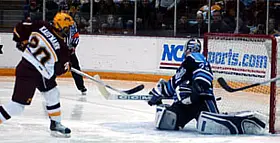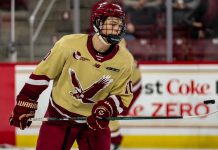Minnesota’s season began auspiciously. Despite the loss of several of its top players, including the early departures of Thomas Vanek and Keith Ballard to the pro ranks, the Gophers cruised through the first half of the season, racking up a 15-4-0 record and the nation’s No. 1 ranking at the Christmas break.
Not bad for a team picked to finish fifth by the coaches in its own conference, though to be fair, there was plenty to choose from in the WCHA. Defending national champion Denver was selected sixth, for Pete’s sake.
The Gophers were rolling behind the strength of their underclassmen, including fiery starts by Ryan Potulny and Danny Irmen and the goaltending of Kellen Briggs. But after one more win — at Boston University in the swan song of Walter [nl]Brown Arena on Jan. 2 — the bottom fell out.

A 4-8-1 stretch ensued, and Minnesota couldn’t even console itself that it came against the cream of college hockey’s crop. Three of the losses were to Michigan Tech and Alaska-Anchorage, which eventually finished 10th and seventh, respectively, in the WCHA.
A home series against UAA on Feb. 11-12 epitomized the Gophers’ frustration. Despite putting 115 shots on Seawolf netminder John DeCaro — backup netminder John DeCaro — Minnesota came out of that weekend with just one point, and with the whispers echoing.
Too young, went the refrain. Not tough enough.
And the Gophers lay in wait.
They waited to prove that they could turn their season around again. A six-game winning streak followed, though those wins, like some of the losses that preceded them, were against the conference’s second tier. Still, the last two, a home sweep of Minnesota State in the first round of the WCHA playoffs, sent the Gophers back to the Final Five, where they had won the last two WCHA championships.
The possibility of a third straight title was dismissed by Colorado College, which shut out the Gophers 3-0 in the semifinals. CC went on to play Denver for the championship, with Minnesota shunted into the third-place game against North Dakota.
The Gophers lost that game too, an uninspired performance in a 4-2 loss to a team that looked like it wanted it more. It was a meaningless game, in the sense that the Gophers still landed a No. 1 seed at the NCAA West Regional, to be played at the Gophers’ own Mariucci Arena the following weekend.
Still, the notion that a 14-loss team which tied for third in its own league, then lost its last two games, could still be a top seed inflamed the sensibilities of those who contended that either Michigan or Cornell, dual titlists in the CCHA and the ECACHL, respectively, deserved the top seed more than the apparently-fading Gophers did.
A week later, Maine, led by star netminder Jimmy Howard, was the Gophers’ next obstacle. For three periods they threw everything but the kitchen sink at Howard, and had a sink been handy, head coach Don Lucia might have been tempted to toss it and see if that would have broken Howard’s impeccable concentration.
After 37 shots on net in regulation without a goal, the frustration had to have set in as Howard refused to let Maine lose.
And the Gophers lay in wait.
They waited for the bounce they needed. And they got it, when unheralded Evan Kaufmann — a freshman who barely played early in the season, when the Gophers were so dominant — found himself alone in front of Howard, on the receiving end of a Garrett Smaagaard centering pass. A split-second later, Kaufmann’s one-timer was behind the Maine netminder, and the Gophers were pouring onto the ice in celebration, or perhaps relief.
Minnesota’s next opponent was Cornell, a team whose stifling, record-setting defense had carried the Big Red to the nation’s best winning percentage, and which displayed its own resilience by coming back from a two-goal deficit to beat Ohio State in the other West Regional semifinal.
Cornell had the added motivation — an opportunity, head coach Mike Schafer said — to show the NCAA selection committee that it had erred in sending the Big Red out west as a two seed. And though the Gophers dominated territorially through the first two periods Sunday, goaltender David McKee made the stops he needed to, and then some.
As the game wore on, Cornell grew stronger, livelier and more confident, beating the tiring hosts to loose pucks, getting more and more looks at Briggs, and setting the stage for a trip to Columbus for itself. The end of the third period came, and again Minnesota found itself in a tie game, despite a 34-15 shot advantage.
And the Gophers lay in wait.
They couldn’t wait too long, not against Cornell’s muscle and determination, and they didn’t have to. Four and a half minutes into overtime, a Gopher again found himself with a free run at the opposing net. This time it was Barry Tallackson in front of McKee, and teammate Mike Howe dug a puck out of the near corner, saw Tallackson and hit the senior winger with a pass.
McKee stopped the first shot, point-blank, but the rebound was there for Tallackson to stuff into the net for a 2-1 Gopher win and a third trip to the national semifinals in the last four seasons.
“We just kept shooting our way through the hard times,” Tallackson said.
And if the early-season Gophers were reliant on their big guns, the version that emerged from the West Regional looked very different. Tallackson’s goal was his 19th point of the season, tied for eighth on the team. The rest of the weekend’s points came from Smaagaard, Kaufmann, Howe and Andy Sertich, none of whom had double-digit goals or more than 16 points.
“Guys stepped in and did the job this weekend,” said Lucia. “That’s what a team is about.”
In net, Briggs did the job as well, though his performance was barely noticed next to Howard and McKee. Barely noticed, until the scoresheet was tallied up and the sophomore had quietly stopped all but one of 43 shots on the weekend, a .977 save percentage that earned him Most Outstanding Player honors.
“Nobody gets more maligned than the Gopher goalie,” said Lucia, whose Minnesota team is known for offensive firepower, not impenetrable defense. “You don’t have to be the best goalie all year, but you have to be the best this time of year.”
Now Minnesota advances to the Frozen Four, part of an all-WCHA ensemble. The Gophers will face North Dakota, the team that beat them in the Final Five, in the evening semifinal on April 7.
“Getting there [the Frozen Four] the third time in four years is pretty amazing,” said Smaagaard, a senior who has been there for all three.
The last two trips, in 2002 and 2003, ended in consecutive national championships. If a third is in the offing, the experience Minnesota gained riding out the tough patches of the season will be a big part of it.
“We had our ups and downs during the year, but we stayed with it,” Lucia said.
And, once more, the Gophers lie in wait.


